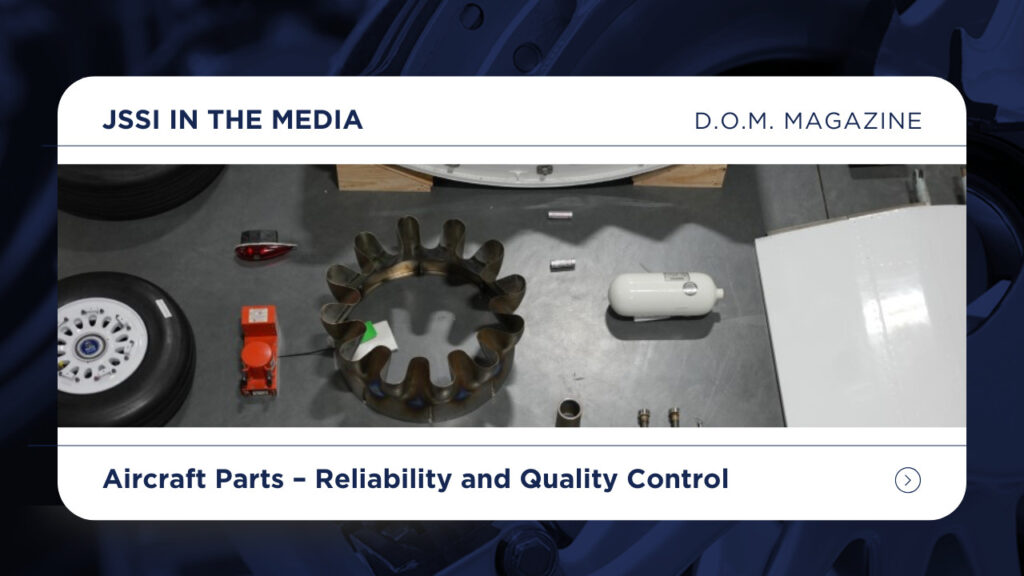
Philipe Figueiredo, VP of Global Business Development – JSSI Parts and Leasing, recently spoke with D.O.M. Magazine about aircraft part quality assurance and maintaining operational and regulatory compliance.
Read the full article in D.O.M. Magazine’s September 2025 issue. (Pg. 48-50)
–
Background
Aviation safety depends fundamentally on the reliability and integrity of every component that goes into an aircraft. In an industry where failure is not an option, the certification and approval of aircraft parts represents one of the most critical aspects of maintaining operational safety and regulatory compliance. Suspected unapproved parts (SUP) can be a concern in the context of the ongoing challenge of maintaining supply chain integrity in an increasingly globalized and cost-conscious aviation industry. Understanding the nature of SUPs, their potential pathways into the aviation supply chain, and the comprehensive systems designed to detect and prevent their installation has become essential knowledge for all stakeholders in the aviation maintenance and supply ecosystem.
Defining SUPs
Philipe comments: “An SUP is any aircraft part that lacks the required certification, approval, or traceability. Unlike counterfeit components, which are deliberately falsified, or lower-quality components, which may simply not meet quality standards, SUP components are of concern because their origin or compliance status is unknown or poorly documented,” he says. “These components could infiltrate the aviation supply chain through unauthorized resellers, unregulated disassembly, or incomplete documentation.”
FAA’s SUP Program – Introduced in 1995
Engines, aircraft, and aircraft systems are equipped with original components, many of which must be overhauled or replaced at specific intervals, the FAA notes in the article. “Component manufacturers must submit a design package to the FAA demonstrating that their component is of equal or superior quality to the original. If accepted, we will issue a parts manufacturing approval (PMA). This means that the company’s component is an FAA approved component. However, some companies manufacture components without going through the PMA process to avoid the time and expense of the process and the uncertainty of whether we will accept a component of equal or superior quality to the original,” the FAA says. “To address this issue, in 1995 we developed a formal ‘suspected unapproved component’ (SUP) program. A key element of this program is to ensure that suppliers and maintenance facilities are aware of the possibility of unapproved components entering the system and have a system in place to report and report them.” PMA lists are maintained in the FAA’s Dynamic Regulatory System (DRS), where one can search for PMAs by PMA holder, PMA item name, number, approval basis, and the make and model on which the PMA component can be installed, the FAA explains.
Risk Mitigation:
“At JSSI Parts & Leasing, our commitment to safety and compliance is reflected in our strict quality controls, collaboration with trusted suppliers, and traceability with every part we deliver.”
Philipe Figueiredo
About JSSI
Founded in 1989 and headquartered in Chicago, JSSI is the leading independent provider of hourly cost maintenance (HCM) programs for business aircraft engines, airframes, and auxiliary power units (APUs). JSSI’s HCM programs cover over 300 different makes and models of business aircraft.
JSSI has constructed a portfolio of complementary business lines that support owners, operators, and maintenance providers across the entire lifecycle of ownership, including parts procurement, maintenance tracking software, aircraft financing, and advisory services.
With 6,500+ aircraft supported by maintenance programs and software platforms, JSSI leverages this wealth of data, scale, and innovation to drive cost savings and provide custom solutions that align to the interests of each client, regardless of aircraft platform. Institutional investors GTCR, Genstar Capital, and Blackstone provide strong sponsorship to JSSI.
Learn more at jetsupport.com.
For media inquiries, please contact:
Isabella Rimton, VP of Marketing, JSSI
+1 302 690 7874, [email protected]

JSSI’s Hourly Cost Maintenance (HCM) Programs bring peace of mind to owners and operators of virtually any business aircraft. Our programs are designed to stabilize your maintenance budget, maximize availability, and enhance the residual value of your aircraft – offering flexible coverage options:
Engine I APU I Airframe I Tip-to-Tail®